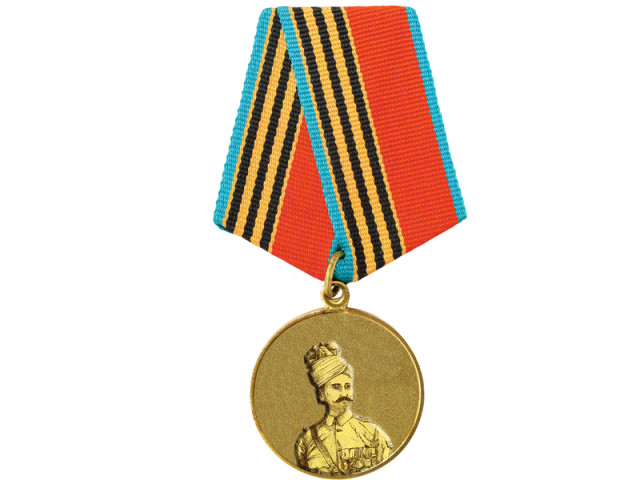World War veteran: Remembering a brave sepoy
All he has left behind is his medals, lessons of courage and memoirs of a life well-lived.

Fully covered in snow during winter, Ghooni Panjhot is a picturesque part of Abbottabad. This area with over 300 houses is where Mirza Khan, one of the last surviving sepoys from World War II in Pakistan, was born. This WWII veteran expired on 5th February 2014, almost a 100 years of age, a life worth celebrating and remembering.
He was laid to rest in his ancestral village Nagri Totial, some 90 km from Haripur and 50 kms from Islamabad. According to his family, the news of the sepoy’s death could not be communicated to other villages because heavy snowfall has blocked roads of the area.
Mirza was the firstborn of Kala Khan, a local farmer from the Dhond Abbasi tribe in Abbottabad. He had four brothers and two sisters. Their children and grandchildren still live here.
Mirza lost his wife five years ago. They had a long companionship as she died at the age of 80. He is survived by two sons and four daughters. Despite his wish, none of Mirza’s family members joined the armed forces. His eldest son, Naseer, did join Pakistan Army as a driver but got retired a few years ago. He is now serving at a hotel in Islamabad.
Mirza joined the Royal Indian Army in 1914. He fought against the Japanese forces in different battlefields. A British gallantry award holder, the brave sepoy retired from Pakistan Army’s Punjab Regiment in 1957.
The sepoy, fondly called Baba by locals, would wear his medals on his waistcoat with pride wherever he went. A socially active member of the community, he often visited the city area and would go to neighbouring villages to attend weddings and social gatherings.
According to the deceased sepoy’s relative and next door neighbour, Kabir Abbasi, he rarely saw Mirza resting. “He would only be in bed when he had a sore throat or fever.” Mirza used medicinal plants for treatment rather than visiting doctors. He was a very old man “yet his teeth, eyesight and hearing capacity were intact. I am sure it was because of a life of hard work and the usage of medicinal plants.”
According to Kabir, Mirza always prayed never to become dependent on his children for anything. The sepoy received pension. He owned a pair of oxen that he used for tilling his agricultural land. He also had cows and goats that he would take to his agricultural land spread over a hundred kanal for grazing.
“I even saw him remove snow from the roof of his house until 2012,” told Khursheed, a villager, while confirming that Baba was the oldest man in the area.
Baba was a straightforward and an honest man. He would never lie. And he rarely lost his temper.
“Baaji [a short form of ‘Baba Ji’] was mentally fit and had no health related problems that older people usually develop,” shared the sepoy’s nephew, Shabbir Abbasi. “According to his documents, he had crossed the age of 120.” A few months before Mirza breathed his last, he had lost his appetite and his movement had become restricted since a year because of old age. “Baaji had stopped bringing firewood, and looking after his cattle and agricultural lands which was his daily routine normally.”
One last wish
“Baaji had a dispute with a villager over property,” shared Shabbir. The villager had allegedly taken over 18 kanaals of Baba’s agricultural land, forcing the WWII legend to move court. According to Shabbir, the case has been pending for the last few years in a civil court of Havelian Tehsil, which is an administrative subdivision of Abbottabad District. “Baaji had been worried; two months ago, his son took him to court to record evidence to prove that the land is owned by Baaji.” The sepoy’s last wish was to get back his land that he had inherited from his ancestors.
Baba and the youngsters
Although illiterate, Baba was yet a staunch supporter of education. During his life, he advocated for better educational facilities for the children of his village. He used to convince young boys and girls to seek education if they wanted to excel in life.
For Baba, being a part of the armed forces brought prestige.
He would advise the youngsters of his family to join the Pakistan Army if they really wanted to serve the country. He used to say that by doing so, it would bring them respect.
Whenever the youngsters of his village would see Baba out in the fields, they would go and sit with him. He would then share stories from that phase of his life in which he participated in World War II. Baba would tell them how he managed to kill several enemies in battlefields and remained unhurt, even during cross-firing.
Baba owned a West End Watch Company’s wristwatch that he had purchased in 1946.
He would wear it all the time and would often tell young people proudly that his watch worked perfectly even after seven decades.
Published in The Express Tribune, February 17th, 2014.



















COMMENTS
Comments are moderated and generally will be posted if they are on-topic and not abusive.
For more information, please see our Comments FAQ